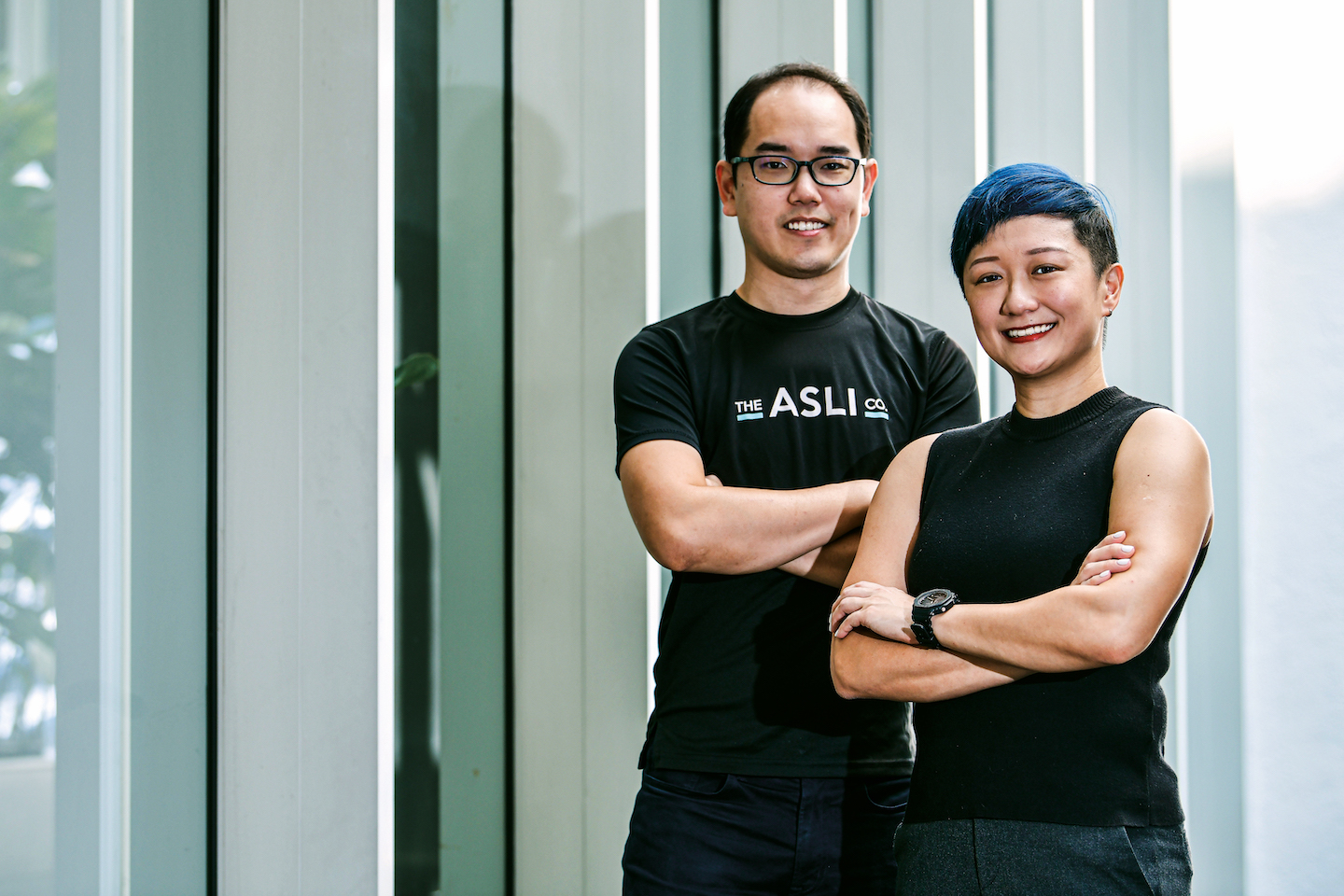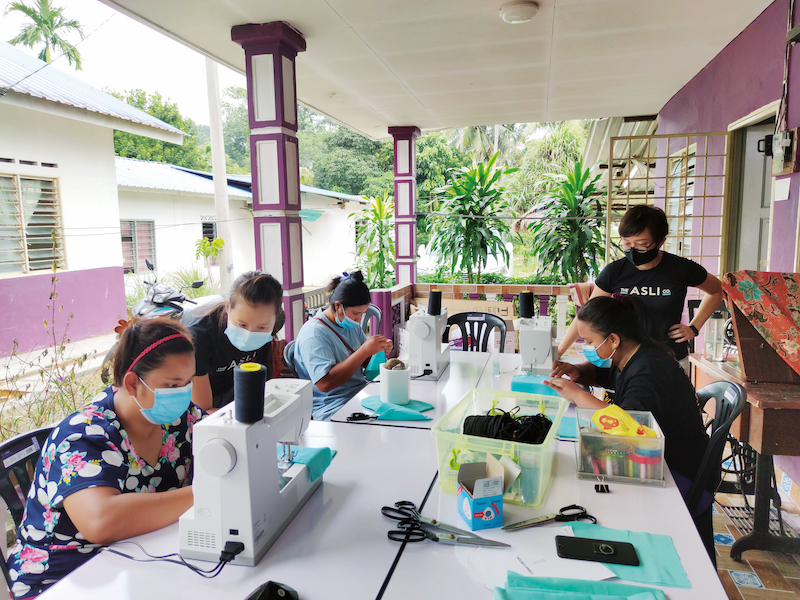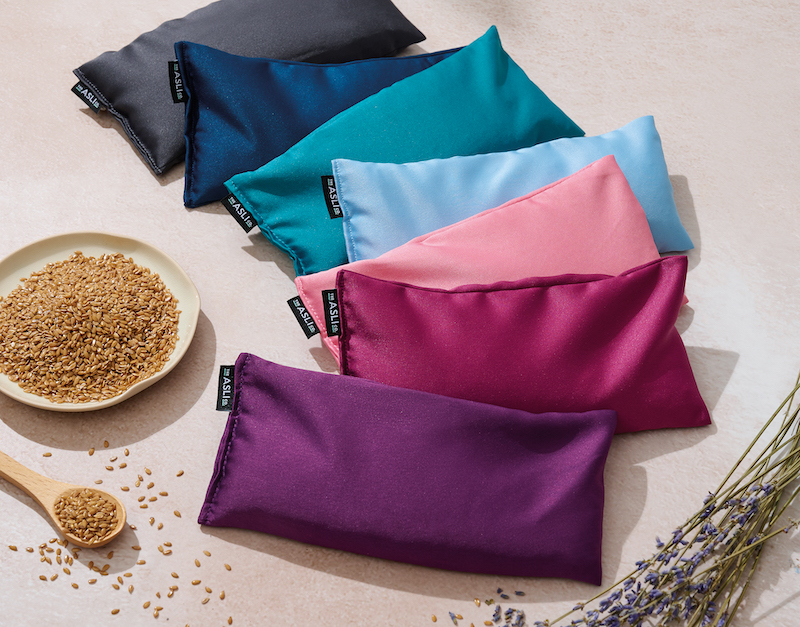
Founders Jason Wee and Lim Xin Yu have provided job opportunities to more than 60 indigenous mothers from eight villages over the last three years (Photo: Zahid Izzani/The Edge)
Jason Wee and Lim Xin Yu have been volunteering to build houses for the Orang Asli in Selangor since 2010. The experience inspired them to establish The Asli Co in 2019, a social enterprise that helps underprivileged women from the community by providing them with the opportunity to work and keep their children in school.
“About 50% of the kids in the kampung were dropping out. It took us a long time to discover that because they didn’t share much about the troubles they faced. We only found out when we asked the ketua kampung,” says Wee.
“We wondered what we could do to assist, so we asked them a very simple question: What is it that makes you guys drop out of school? The answer was they were short of cash. We asked how much money was needed. It’s only RM150 per child per month — that would cover their school fees, uniforms and books.”
While donating RM150 was doable, it would not be sustainable in the long run, says Lim. “We thought, ‘How many kids could we help if we personally donated to a family?’ Our idea was to establish a business that would help give this amount to the mothers every month, allowing them to earn with dignity instead of just receiving donations. We started the business with sustainability in mind. It shouldn’t be a short-lived programme where the mothers get one-off aid or job. We wanted it to provide a monthly income.”
With just RM200 in hand, Wee and Lim came up with the idea of making pots for succulents. They bought cement and knocked on the doors of the women they had built houses for in Kampung Orang Asli Serendah, Selangor, asking if they wanted to start a business together. “We told them we had the cement and could teach them to make pots using used plastics cups as moulds.”
copy_of_img_20200702_113458.jpg

They started working with one kampung to roll out the first few batches of products. As the orders grew, the mothers could not cope and eventually began roping in their family and friends, who helped spread the word to other villages. Those interested in sewing and making products were keen to be a part of the team. “It progressed organically through word of mouth from mothers who are happy working with us,” says Lim, adding that classes and workshops are provided and taught by them.
While Wee handles customers as well as accounts and corporate orders, Lim is in charge of designing the products and the brand’s website, drawing from her 10 years of experience in those areas prior to setting up The Asli Co.
“When coming up with ideas for new products, I always think of designs the women can make comfortably at home … something worth their time. We want to pay them enough so they can support their children. We don’t want to create something that takes a long time to make but for which they’re paid little. Our job is to design, package, market and sell to ensure there is constant demand, so they can get the additional income and their kids don’t drop out of school,” she says.
Their aim is to produce items customers will keep buying after they have finished using them. That was not possible with pots because “how many pots can one family buy? Not everyone likes plants. We had to think about what people wanted, what the women could make from home and what people would continue buying. That’s why we came up with soaps”, says Wee.
Over the last three years, The Asli Co has worked with more than 60 mothers from the Orang Asli community and disbursed over RM1.1 million to cover raw materials, equipment and wages. The workers make RM600 a month on average and are paid up to four times the minimum hourly wage.
The partners are targeting to increase production so the mothers can earn up to RM1,000 per month. They have also been able to hire five young Orang Asli adults (below 25) as full-time employees at their office in Bandar Utama, Petaling Jaya. Their roles include marketing, administration and handling packages.
Flexible working hours that allow the workers to balance motherhood and making extra income are why the women love working with the company, say the partners. “They want to work, so we bring the job to them. They have time at home and they say the hours are flexible. In the morning, they get their kids ready for school. Then, they start making products while waiting for the children to come home. They don’t have to leave the house to go to factories and work for a full eight hours,” says Lim.
The Asli Co offers products such as pots, soaps, face masks, sanitisers, tote bags, cup holders and — its latest offerings — eye pillows and pillow mists. Different villages manage different things. For example, Kampung Bukit Serok in Pahang makes tote bags, Kampung Orang Asli Serendah and Kampung Orang Asli Hulu Kuang in Selangor produce eye pillows and sanitisers, while Kampung Desa Temuan in Selangor makes soaps.
the-asli-co-lavender-eye-pillow-colors.jpg

At the height of the pandemic, the sales of pots and soaps dropped as offices were closed. However, Hong Leong Bank reached out to them to offer support that would allow The Asli Co to buy sewing machines to kick-start the production of their next items — fabric face masks and sanitisers. The bank placed a bulk order for soaps and sanitisers, which provided the brand with enough capital to buy three sewing machines.
The label took off during the pandemic and that gave the duo confidence to quit their respective jobs and focus on social entrepreneurship full-time, as it was gaining recognition from customers. The Orang Asli mothers were also happy to work as their husbands had lost their income during that period. “Most of the indigenous people were factory workers and the factories were shut. The women became the sole breadwinners,” says Lim.
The Asli Co also offers corporate gifts, which make up about 80% of its sales. More demand means more income for the indigenous mothers. Wee and Lim say one of the challenges faced by social enterprises like theirs is getting the word out so more people and corporations can come on board. “When they purchase from us, it actually helps them hit their ESG (environmental, social and governance) targets because we’re part of the social aspect. A lot of companies have been supporting us because they want to hit their ESG targets. We couldn’t have come this far without all the organisations that have been placing orders for care packages to give employees.” Its corporate clients include Hong Leong Bank, Maybank, Petronas, Shell, Sime Darby and Gamuda.
Wee and Lim have set up a non-governmental organisation called Ajar, or Asli Juara Academic Rewards, which encourages children to do well in school by offering rewards such as school supplies or trips to attractions like KidZania. It also offers tutoring programmes for indigenous kids, where bright secondary students are hired to teach the younger ones.
The partners urge everyone to do good and hope that their work will continue to impact more Orang Asli in our country. “Even a small business like ours can do so much. What if big businesses follow suit? They could do so much more.”
This article first appeared on Jan 23, 2023 in The Edge Malaysia.


